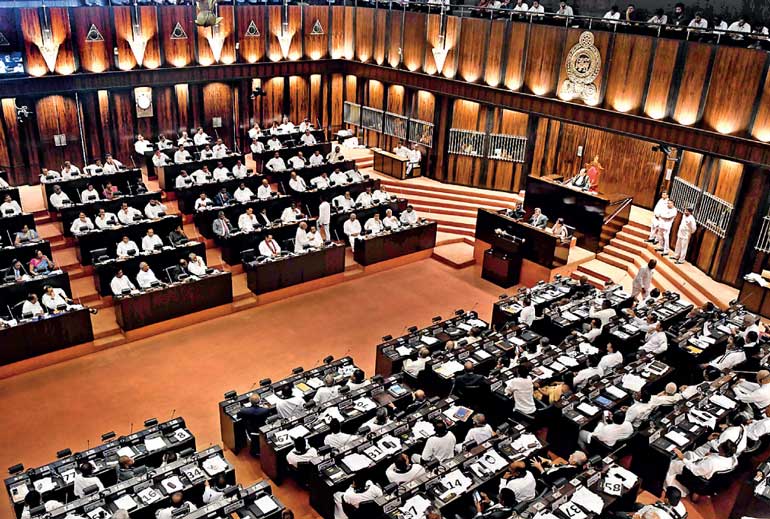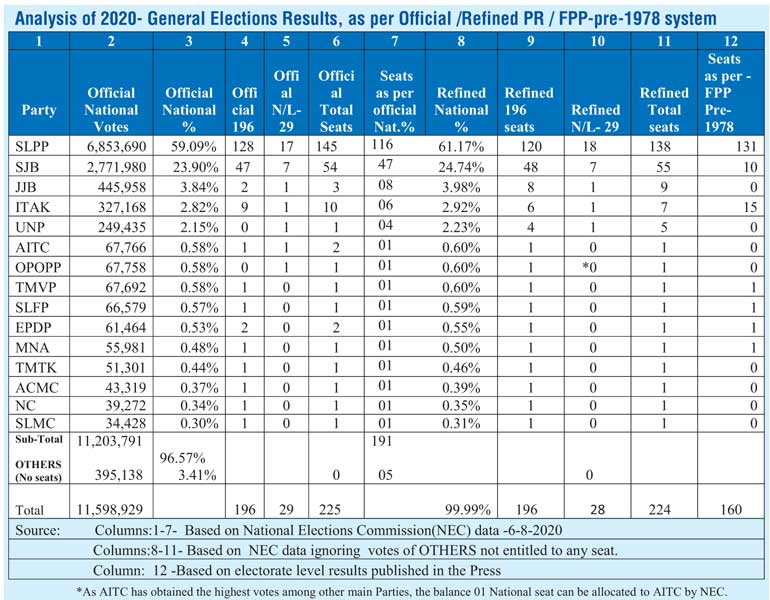Wednesday Feb 18, 2026
Wednesday Feb 18, 2026
Saturday, 23 April 2022 00:00 - - {{hitsCtrl.values.hits}}

 Preamble
Preamble
The writing is now not only on the wall, but also on the placards of the silent populace lining the roads. The following slogans on the placards are sufficient to grasp their exasperation and expectations – “What is the point of an educated population if the decision makers are uneducated”; “Reverse the 20th Amendment” and “When injustice becomes law, resistance becomes duty”. So is it reverberating on the lips of those representing all walks of life sighing in the winding queues in anguish to buy their daily essentials even at a price!
Another headline from a reporter of the Parliament proceedings reads as “A lot of noise but little headway in the House that takes Avurudu break”! The unanimous cry that ‘All 225 must go’ is loud and clear and has reached a crescendo implying the immediate need for ‘system changes’ through the Constitution and ‘Electoral Reforms’. It is public knowledge that the final report submission dates of the respective Cabinet and Parliament appointed Committees are being extended several times possibly to give ear to more and more self-serving political parties and some civilian collectives with their own agendas.
The scenario now prevailing in the country should surely open the eyes of, the respective Committee members and make them realise that calling for views and discussing with the present day political parties is an exercise in futility that befits the pithy Sinhala saying ‘Horagey ammagen pena ahanawa wagey’! The sad irony that adds insult to injury is, though these Committees have called for proposals from the public, we have so far not heard of their lending an ear to any sovereign voter who has submitted a worthy package of proposals in the interest of the country.

Therefore, in response to the pulse and cry of the fellow sovereign voters, the writer wishes to share with one and all, a gist of the package of ‘system changes’ with accruing benefits, submitted by him to the aforesaid Committees plus the National Elections Commission (NEC) and voter dedicated organisations/activists, more than a year ago.
A sovereign voter’s package of immediate ‘system changes’ to avoid further curse of the ‘225’
1) The primary objective of a General Election is to ensure democracy and accuracy in the allocation of seats in the National Parliament by maintaining an ‘equal value’ to each valid vote cast to parties entitled to the limited seats. Towards such end, consider the entire country as a ‘Single Electorate’ for all Sri Lankan voters excluding total votes categorised under ‘Others’ who are not entitled to seats. Thereafter, apply proportionate arithmetic to the ‘Net-national aggregate’ of valid votes and allocate the national seats to the seat winning parties. (See Col. 6 & 11 in the given table for differences between existing and refined allocation of (196+29) seats in the 2020 Parliament). Such refined seats allocated to each party should then be apportioned to districts/electorates by again applying proportionate arithmetic in order to appoint district/electorate MPs from the district/electorate wise merit lists. It would be seen that the distortion in the allocation of 225 seats has arisen from a) fixing a predetermined No. of seats on a district basis for a country-wide election, b) creation of 22 bonus seats without any vote backing and c) rejection of valid votes caused by the imposition of 5% district-wise minimum vote requirement.
Benefits:
i) Guarantees democracy and accuracy by giving ‘equal value’ to each valid vote cast in North, South, East and West.
ii) Boosts voter confidence due to democratic, accurate and transparent allocation of seats to Parliament.
iii) Builds up ‘Sri Lankan’ness at national level.
2) Firstly, to achieve the secondary objective of a general election, repeal the infamous, ‘optional’ ‘preference voting mechanism’ in order to pave the way to select and elect suitable ‘political professionals’ to occupy the 225 seats.
Benefits:
i) The electoral process will instantly become very much simpler, more meaningful and non-violent.
ii) Expenditure, time and energy spent by Elections Dept. will come down drastically.
iii) Main Election results can be announced before midnight.
iv) The total election exercise will be environment and people friendly.
3) Secondly, to ensure that a ‘crème dela crème (225) of honest ‘political professionals’ committed to achieve the main objectives of the Parliament with ‘Country first’ attitude are selected based purely on ‘meritocracy’ to represent a multitude (16.3 m) of sovereign voters, NEC to stipulate compulsory eligibility criteria and structured interview marking systems for applicant party candidates from time to time.
Towards such end, the simplistic ‘Elector’ requirement in Article 90 of the Constitution to be duly amended/expanded to include specific minimum educational, professional and other eligibility criteria (age limit, health condition, declaration of assets and liabilities, etc.) and structured interview marking criteria (to assess qualities such as high integrity, analytical ability, leadership, communication skills, social integration and overall suitability) according to needs of the prevailing times.
Special pre-interview marks to be stipulated by NEC to prospective women candidates to achieve the 25% requirement. (Please refer item 4 below)
Overall emphasis would ideally be placed on lawyers, accountants, economists and wise and experienced ‘political professionals’, since the main objectives of the National Parliament are to frame and approve laws/policies, control national finances and approve national/decentralised budgets, etc.
Parties should function as registered corporate bodies and amend their own constitutions to conform to NEC regulations.
Benefits:
i) Advent of ‘political professionals’ in large numbers to the Parliament will promote ‘Country-First’, constructive, consensual debates by decent persons with professional behaviour maintaining decorum of the supreme Parliament.(These qualitative and attitudinal outlook are strong expectations of the sovereign voters)
ii) The curse of the ‘225’ will come to a grinding halt!
iii) Simple voters will not be asked to elect ‘Horses’ from adhoc Party lists of ‘Donkeys’!
iv) Hackneyed terms such as ‘Unstable Govt.’, ‘Hung-Parliament’, ‘Cross overs’, ‘Deal Politics’ and ‘2/3rd Majority’, etc. will become irrelevant.
4) Allocate specific ‘pre-interview’ marks to women candidates to rank them high in the final district/electorate wise merit lists of candidates, to ensure the required % for women MPs in the Parliament.
Benefit: This % which could not be achieved under the new ‘Mixed Voting’ system will now become a reality.
5) To accommodate First-Past-the Post (FPP)/Proportionate Representation (PR) /Central Pool proponents on an equal basis, NEC to allow parties to select one of the captioned Nomination lists stated below to submit names of their candidates.
a) District-wise list (196) in merit order as per original PR system.
b) Electorate-wise merit list (160) in keeping with the FPP system. Parties can assign more than 01 candidates to larger electorates to meet the 196 requirement.
c) Central pool of names (as was adopted by the JVP.)
Benefits:
i) It is a simple and flexible alternative for ‘Mixed voting’ system that has painfully adopted ad hoc ratios to satisfy only FPP and PR proponents culminating in, ‘Over-hang’ problems, and delays in the release of results and uncontrolled increases in the number of members.
ii) It allows all relevant proponents to meet their expectations.
iii) It keeps the required no. of seats constant.
6) National list members too to be selected as per criteria laid down by NEC to achieve their special objectives.
Benefits:
i) It provides a rational and transparent method acceptable to voters.
ii) Having MPs to meet special objectives is useful for parties to achieve their specialised tasks and project their party image.
iii) They provide an easy avenue for replacement by specialised MPs during demanding times such as formation of ‘Interim Administration’ regimes.
iv) Since they are elected in proportion to the national vote aggregates of parties, no injustice is done to any party.
Sub-proposals relating to 5 & 6
i) Parties should add a few extra names in merit order at the bottom of their lists and prepare separate preliminary district/electorate merit lists for 196 MPs and one separate list for 29 National list members.
ii) They should be published in the press covering at least one Sinhala, Tamil and English National paper to allow objections, if any, by the public before a date specified by NEC. Final lists to be registered by party secretaries on or before the nominations day certifying their correctness together with an affidavit as per specimen of the NEC.
iii) If any lapses or disqualifications are observed, the returning officer can reject nominations of such candidates.
iv) If disqualifications are detected after the election, they can be challenged in courts through election petitions. As all nominees have conformed to NEC criteria, the successful party may be allowed to name any candidate of its choice, from the relative registered list though normally, it would be the next in such merit list.
Benefits:
i) Costly and disturbing By-elections can be avoided. Since the prevalence of regular independent and reliable ‘opinion polls’ by the mainstream and social media is becoming the order of the day, they can be strengthened. Waiting for uncertain ‘By-Elections’ to test the popularity of the governing party at much cost to the state and economic activity is counter-productive.
ii) Voters are ensured that ‘Horses’ are replacing ‘Horses’.
iii) More flexibility to parties when filling vacancies according to changing demands.
iv) Electoral system wins the confidence of voters and parties.
7) a) Ban ‘cross-over’ mockery.
b) Member vacancies resulting from such attempts to be filled by any name/s in the relevant district list.
Benefits:
i) It removes corrupt and ‘deal’ politics and restores ‘collective sovereign voter conscience’ as ‘principals’, over the individual conscience of ‘mps’ who are only their ‘agents’/representatives.
ii) Prevents abrupt changes in the balance of power created by the sovereign voters for a specific period, by highly unethical and corrupt ‘deal-politics’ as happening under the present system.
iii) Unwarranted instigations and situations will be prevented.
iv) Allows flexibility in nominating replacements.
8) Entire ‘campaign financing’ should be undertaken by the party hierarchy at head office as it takes the total ownership of candidates having selected, ranked and listed them under their own list-type.
Benefits:
i) Campaign financing can be easily compiled, monitored and audited by the authorities.
ii) Party head offices can focus their campaigns on ‘election manifesto’ as well as on the quality of their candidates under their own ‘list type’.
iii) Deserving candidates without financial backing can come forward.
9) Discourage registration of ‘dubious’ political parties by imposing stringent eligibility and high cash deposit requirements. (353 independent parties contested at 2020 Election accounting for more than 3% of National votes)
Benefits:
i) Shorter ballot papers reduce voter confusion.
ii) Reduces rejected votes.
iii) Reduces unnecessary costs, energy and time wasted in the total process.
10) To convince voters to accept ‘election manifesto’ as the main document for their decision, establish an Institutional follow-up/audit procedure to monitor the implementation of the relevant ‘manifesto’ within given time frames and/or make it a ‘prosecutable’ document.
Benefits:
i) Being an acceptable, genuine document, the ‘Election Manifesto’ will become the main factor for voter decision.
ii) Due to the Follow-up/Audit mechanism, the people will have more faith and confidence in realising their expectations.
11) To reach the ultimate level of ‘Sri Lankan-ness’, apply PR arithmetic to allocate the constitutionally specified No. of Cabinet (30) and State (40) Ministries so that all seat winning parties will be represented in the Cabinet. The portfolios to be allocated by consensus among Party leaders, President and the PM.
Benefits:
i) A Cabinet shared by all seat winning Parties, will remove the hackneyed ‘Sinhala Govt.’ label making a ‘Permanent National Govt.’ a reality.
ii) Enable the country to develop in true ‘Sri Lankan’ spirit’.
12) Make ‘Executive President’ a ‘Non-Partisan-Statesman’ by calling for applications from ‘Independent’ Candidates, conforming to a robust set of eligibility criteria laid down under the respective Act.
Benefits:
i) An ‘Independent’ Executive President, will strengthen the proper functioning of the ‘3 Pillars’.
ii) It will make the 2nd preference in the ballot paper more meaningful and easier for the voter to select an alternate candidate.
iii) The presence of an independent ‘task master’ will ensure proper follow up and implementation of laws, budgets and programs proposed under the ‘Election Manifesto’ of the governing party as and when approved by the Parliament.
Alternate proposals arising from recent developments in the country
i) Powers of Executive Presidency to be reduced by repealing the 20th amendment and removing other obnoxious clauses such as immunity from judicial review.
ii) 19th amendment to be restored with suitable modifications.
iii) In the alternative, Elected Executive Presidency to be substituted by a Ceremonial Presidency with additional powers to ensure Execution of the Laws and programs in the ‘Election Manifesto’ of the Governing Party as and when approved by the Parliament and implementation of approved Parliamentary and Decentralised Budgets through the Provincial Govt. Administration system.
13) Transform the Prov. Councils to more efficient and productive bodies with additional powers (If necessary) and specific role responsibilities under the direction and supervision of the President working through Provincial Governors.
Benefits:
i) Peace, discipline and prosperity will return.
ii) Due to the resulting fair and balanced prov. development, national reconciliation efforts will succeed.
iii) Peripheral politicians will receive due recognition.
iv) Role of 225 MPs will be limited to law/policy making and handling national/decentralised budgets/finances.
v) Such MPs will not require luxury ‘duty free’ vehicles and ‘decentralised funds’, but will monitor fund usage through DDCs thereby facilitating a ‘bottom-up’ approach.
14) Hold Presidential and General Election on one legally specified date.
Benefits:
i) The massive expenditure, time and energy required to hold two all-island elections coupled with extra costs to comply with potential health regulations, can be halved and utilised by the Govt. in priority areas.
ii) Practically, the voters can decide on their ballots more rationally.
iii) The entire country will save millions of precious ‘man hours’ towards enhanced productivity.
15) PC elections too, to be held on one specified day after necessary amendments.
As all PCs are now defunct, it is practically possible to hold island-wide PC elections.
Writer’s proposal for a rational, low-cost and a simple method for PC elections has already been published in the press and referred to the Ministry of PC & LG by the PM’s office.
Benefits:
i) Reduces political interference arising from staggered PC elections.
ii) Enormous saving of Govt. and public resources in terms of money, time and energy.
16) De-politicise Local Govt. bodies and allow respectable, acceptable, sociable and honest ‘Independent’ candidates’ from the locality to contest, in line with ‘Grama Rajya’ concept.
Benefits:
i) Ensures a fair and unbiased flow of assistance to local people sans bribery and corruption.
ii) Provides a training ground for future patriotic and genuine ‘political professionals’.
17) A related proposal: Mass media to shift the limelight from the 225 at the Parliament to give more coverage to Provincial and local news/programs with emphasis on the country’s development efforts.
Benefits:
i) It would convince the public about the existence of an effective decentralised political administration system.
ii) Public will be aware of the country’s development efforts.
iii) Public will change their attitudes towards the 225 and become more patriotic.
iv) It will increase the country’s productivity.
v) Public will be better informed about provincial politicians and their activities.
Conclusion
1. Presence of complex electoral systems beyond voter perception for 74 years, producing unrefined seat computations and unsuitable politicians has disillusioned the simple and honest sovereign voters as manifested by the current situation in the country. The above mentioned proposals based on ‘democracy, accuracy and meritocracy’ offer a simple, transparent, rational and low-cost package of ‘system changes’ demanded by the youth and the new generation to create a positive attitude towards our electoral systems and the politicians.
2. As a result, the people, politicians and the mass-media will, as true ‘Sri Lankans’ adopt in unison, the theme – ‘Country first, Country second and Country third’ and work with dedication towards a new and resilient Sri Lanka.
3. Finally, the writer as a sovereign voter, is confident that all concerned authorities, citizens’ organisations and the people of Sri Lanka, will seize this final opportunity to bring about the said ‘electoral reforms’ before next election to usher in a new era of sustainable peace, security and development with honest and educated decision makers.
(The writer is a former banker and could be reached via email at [email protected].)